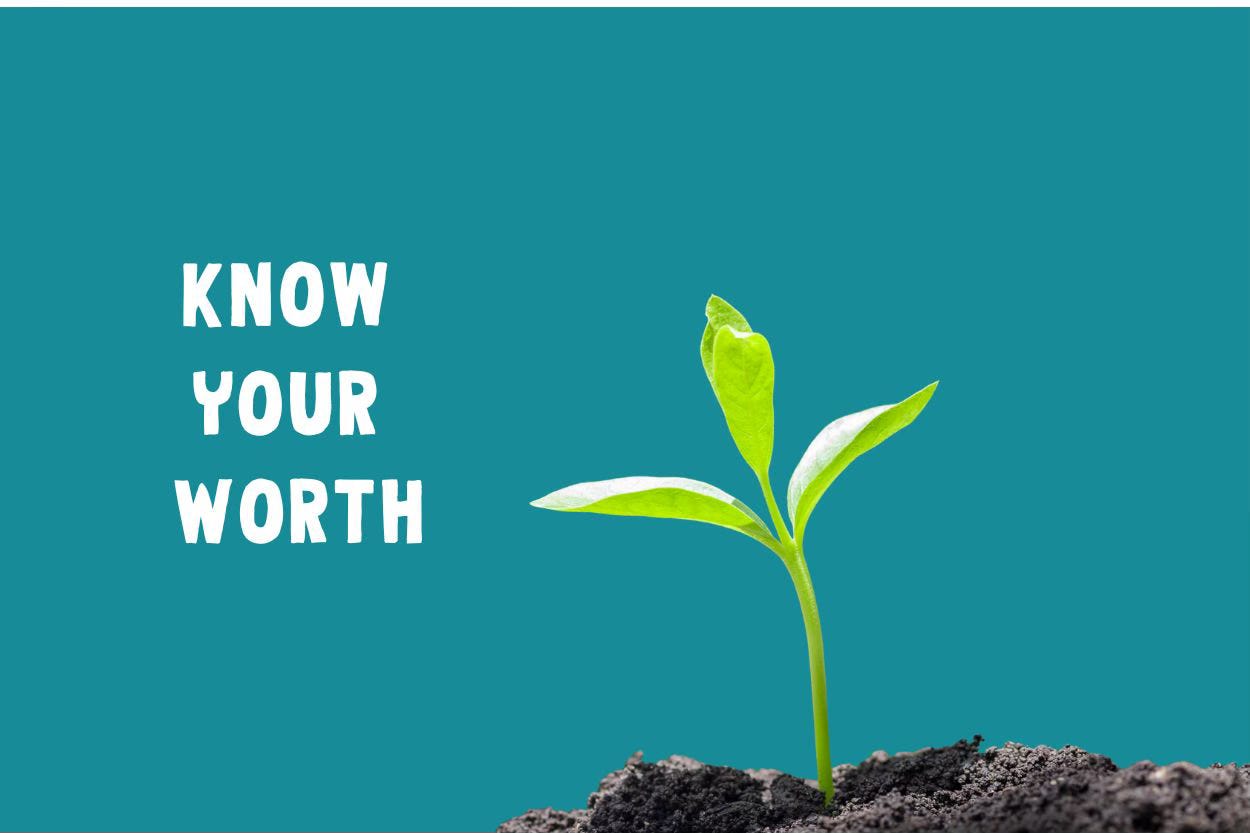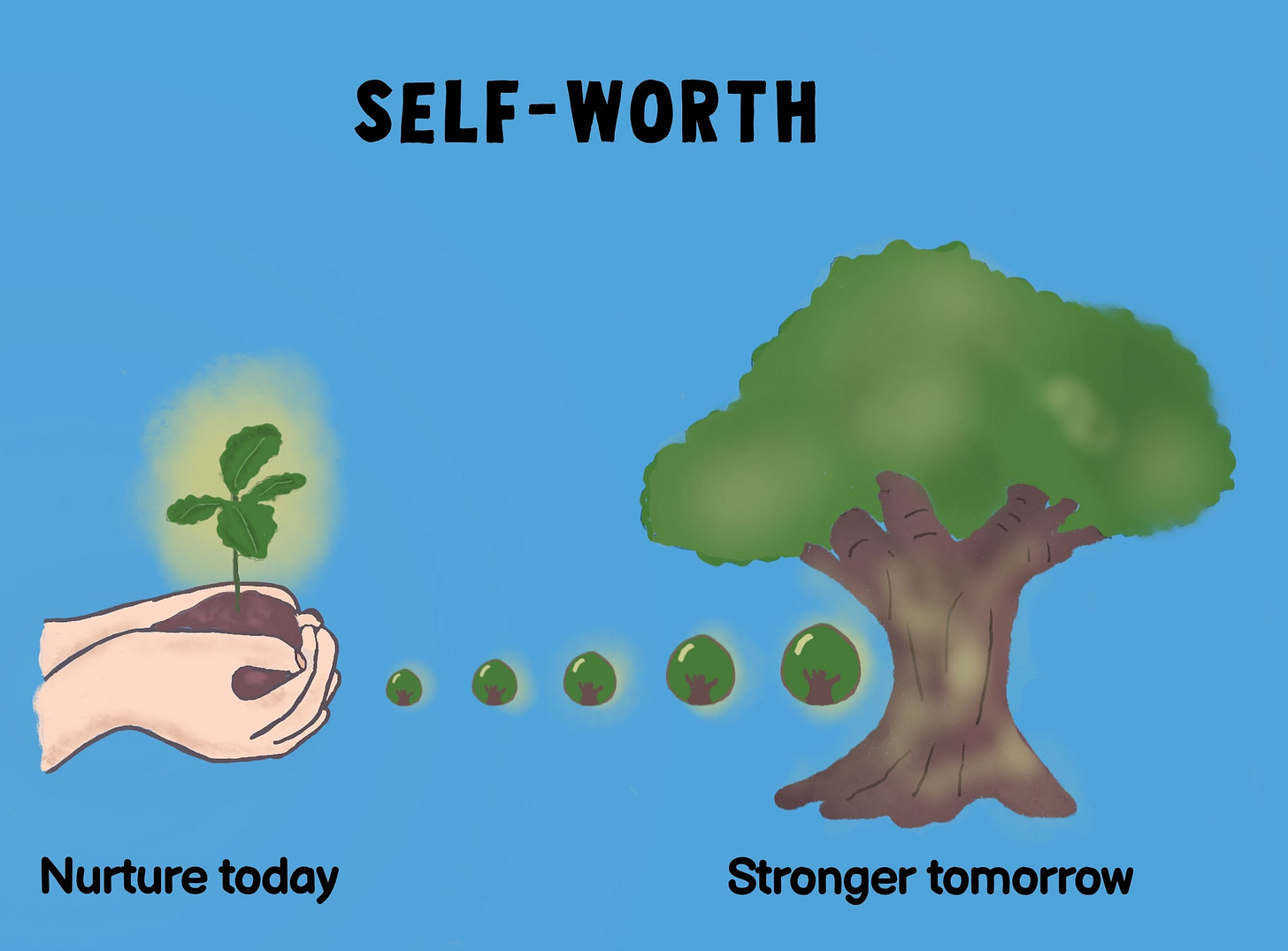If You Don’t Believe You Matter, Nothing’s Ever Enough
Why chasing external validation keeps you stuck and how to break free.
Prefer to listen? Here’s the audio version:
You work hard.
Reach that goal.
Get that promotion.
Launch your idea.
Hit that personal milestone.
Yet, something is missing. Instead of satisfaction, you feel anxiety, restlessness, or the ache of imposter syndrome.
That’s the high-achiever’s paradox. No matter how much you do, it never quite feels like enough.
Why? Because success doesn’t equal self-worth.
Until you understand the difference, you’ll keep chasing validation that can never deliver what you’re looking for.
The mask of confidence
Confidence, self-esteem, and self-worth aren’t the same. You can be highly confident in your abilities and still believe, deep down, that you’re not enough.
Here’s the difference:
Confidence is the belief in your ability to get things done.
Self-esteem is how you judge yourself. It can be stable, rooted in values. Or fragile, tied to approval.
Self-worth is the unshakable belief that you matter just because you exist.
For years, I didn’t know that.
In my twenties, I thought confidence was the key to success. To speak up, to be taken seriously, to stand out. So I did what many people do. I tried to ‘fix’ it with hypnosis tapes, personal development seminars and affirmations.
Some of it helped. But underneath? Same old insecurities. I still didn’t feel good enough. I still kept myself small, unable to say no, working way too hard.
One day, years later, I stumbled across The Six Pillars of Self-Esteem in a bookshop. The ideas spoke to me. I thought, 'This is it - self-esteem is the answer!’ I tried to apply the principles, but it never quite clicked. It felt like it was a key part of the puzzle, but with the last piece frustratingly still missing.
I kept searching, exploring. It took a long time, but I got there.
It really landed when I read the words of John Niland in his book ‘The Self-Worth Safari’:
‘Self-worth… it’s a fundamental, unconditional friendship with ourselves.’
It was the missing piece.
Self-worth isn’t something you earn; it’s how you treat yourself. Like a friend you value. With care, with thoughtfulness, with compassion.
Self-worth is being enough
With low self-worth, self-esteem, and confidence are brittle.
A harsh comment, a bad day, or even a small failure, and they can crumble.
When you build solid self-worth, it positively impacts self-esteem and confidence:
1. You develop stable self-esteem, because your worth doesn’t go up or down with each win or failure.
2. That fuels the courage to try, fail, and grow, building confidence.
3. And as your skills improve, your confidence reinforces your self-esteem.
But there is more. Self-worth is not only mental; it needs your body to feel safe. This is where your nervous system comes into play.
Self-worth needs safety
Feeling worthy isn’t just psychological; it’s biological.
Your nervous system decides whether you’re safe. And unless it feels secure, your mind can’t believe you are worthy.
In a state of safety (the calm “ventral vagal” state), your brain engages in logic, empathy, and connection. Self-worth becomes possible.
In threat (fight, flight, or freeze, etc.), your brain goes into survival mode. Worth gets tied to performance, or vanishes altogether.
Chronic stress or trauma keeps your system on alert, reinforcing the belief:
‘I’m not safe, so I must not be worthy.’
Self-worth grows through radical self-compassion
Self-worth is core for psychological wellbeing, it gives you real, tangible benefits:
You can handle criticism more constructively; you don’t see it as an attack on your core identity.
It’s easier to set healthy boundaries without feeling guilty.
You become more centred, calm and collected.
You don’t need to people-please as much.
Mental anxiety eases.
Becoming a friend to yourself takes time. The challenge is you need to peel away layers of limiting self-beliefs, harsh judgments and survival strategies that get in the way.
I want to offer you a way that works with quiet persistence. That builds your self-worth so you can experience these benefits for yourself:
Radical self-compassion
Try these three ways to care for yourself.
The Friend test
For something you are dealing with right now, ask yourself:
‘If a close friend came to me with this exact struggle, what would I say?’
Now, say your response out loud (if you are not alone, do it internally). Mean it. If it helps, close your eyes and visualise yourself having this conversation.
Touch
A gentle touch is a way to calm your body and signal to your system that you are safe.
Use it when you need to self-soothe, specifically, when you are feeling anxious, emotionally hurt or stressed.
Place a hand over your heart, on your forehead, or on both. Another option is to gently stroke the outside of one or both of your arms with your hands (cross-arm position).
Forgiveness
When you mess up, feel your feet on the ground. Take a breath and sigh it out gently.
Then say to yourself:
‘I made a mistake.
It’s OK.
I forgive myself.
I am enough.’
If other words feel right, use them instead.
You’re separating your actions from your worth. That’s the shift.
Saying ‘no’ is an act of self-worth
Every time you say ‘no’ to something that drains you, you say ‘yes’ to your self-worth.
Boundaries aren’t selfish. They’re proof that you believe your time, energy, and values matter.
Use the Why Test before saying ‘yes’:
Pause, feel your feet on the ground, then ask yourself:
‘Am I doing this because I want to or because I’m scared of disapproval?’
Feel what is going on in your body.
Contraction and tension indicates no, expansion and ease indicate yes.
Respond with your answer. If you need more time to decide, say so.
From doing to being
I leave you with some thoughts to ponder. If you developed a higher level of self-worth:
How would you treat yourself differently?
What would you allow yourself to do?
And how would your relationships shift?
I invite you to try one instance of radical self-compassion today. One small step.
Remember, you are enough.





